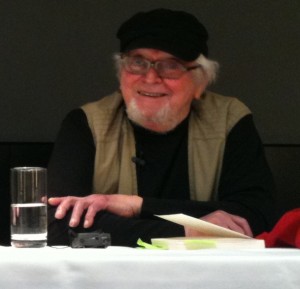By Bob Hicks
Someone called Singlet, responding online to the obituary in The Guardian for the novelist and children’s writer Russell Hoban, had this to say: “A few comments that Hoban’s other novels don’t come close to Riddley Walker make me think of what Joseph Heller reportedly said when asked, ‘Why have you never written anything else like Catch-22?’ — ‘Well, nobody else has either.'”
 Exactly.
Exactly.
Hoban, the American-born writer who died in his adopted England on Tuesday at age 86, was far from a one-hit wonder. But Riddley Walker, his 1980 novel set in the crude countryside of Kent a couple of millennia after a nuclear apocalypse, is undoubtedly his Catch-22, the novel of astonishing accomplishment and originality that stands as the peak of a fertile and often brilliantly surprising career.
Young Riddley lives in an age of rubble: partly Mad Max free-for-all, partly pre-Roman Celtic drudgery, partly tightly controlled medieval theocracy. What quickens the book, and distinguishes it from the standard run of post-apocalyptic lit, is its language, a wildly inventive yet carefully considered deconstruction and reassembly of contemporary English as it might have devolved and reinvented itself in the centuries after a global disaster. The writing is constantly involving and often hilarious, and once you get the hang of it (reading a couple of pages out loud helps immensely) it makes extraordinary sense. A lot of other writers have made hay by taking liberties with the language and its tangled roots: James Joyce poetically and esoterically; J.R.R. Tolkein allusively and academically. Hoban did it with a literary everyman’s gusto and sly wit.